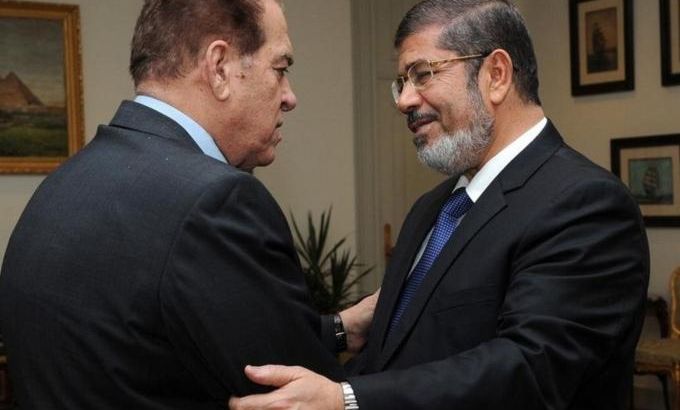Egypt’s Morsi calls for unity after poll win
Victorious Muslim Brotherhood candidate will need to negotiate the extent of civilian rule with the military.

Egypt’s president-elec, Mohamed Morsi, is set to building a civilian administration to overcome deep political division, and to coax a mistrustful army into relaxing its grip on power.
Behind the scenes, talks were already under way between the Muslim Brotherhood and generals to resolve disputes that blew up this month over steps by the ruling military council to hem in the powers of the first freely elected president Egypt has known.
Morsi retains the right to appoint the prime minister and cabinet. He has already begun talks to form a presidential team and cabinet that “would truly represent Egypt after the revolution,” according to a statement on the Brotherhoods’ Twitter account.
Morsi claimed victory just hours after last week’s runoff election, based on unofficial numbers tallied by the Brotherhood, but the commission delayed its official announcement until Sunday.
In the intervening days, Khairat al-Shater, the Brotherhood’s political boss, met generals from SCAF at least once. Sources say they were negotiating exactly what powers the president will have.
Shortly before the polls closed last week, the generals issued a decree sharply limiting the powers of the new president. It permitted him to declare war, for example, only with the approval of the military council.
SCAF will also keep control of legislative power, and the budget, until a new parliament is elected. Egyptians went to the polls in November to elect a legislature, which was dominated by the Freedom and Justice Party, but it was dissolved earlier this month after a high court ruling found parts of the electoral law unconstitutional.
Despite Morsi’s victory, many of those questions about his power remain unanswered.
Gehad el-Haddad, Morsi’s campaign spokesman, said in an interview shortly after the results were announced that Morsi would work to be a “president for all Egyptians”.
“This is not the end of the game, it’s a start of a huge responsibility,” el-Haddad told Al Jazeera.
“It comes with more challenges, turning from being the largest opposition group in Egypt to leading the country with its national front.”
Explosion of joy
Cairo’s Tahrir Square, theatre of the revolution that ousted Hosni Mubarak, exploded in joy – and relief – on Sunday as Morsi was declared the narrow but convincing winner of last weekend’s presidential run-off against Ahmed Shafik, another scion of the military establishment which has ruled Egypt for 60 years.
The president-elected delivered a victory address on Sunday night. He spoke on state television, long a medium which demonised him and the Muslim Brotherhood. He thanked the Egyptian people for their votes, calling them “my family” and “my beloved,” and promised to work to “restore their rights.”
“I have no rights, only responsibilities,” Morsi said. “If I do not deliver, do not obey me.”
He also reached out to the army, the police, and Egypt’s intelligence services, thanking them for their work in protecting the country, and promised to “preserve” the military.
Crowds were still gathered in the early hours of Monday morning.
The celebrations continued through an unforgettable night after Morsi won by 3.5 percentage points or some 880,000 votes.
Those in Egypt and beyond who feared a win for Shafik might have spelled the end of the Arab Spring acknowledged a triumph for the popular will, and for the army which accepted it. From Syria’s opposition came word that Cairo was again a “source of hope” for a people “facing a repressive war of annihilation”.
But beyond the vast throng who waved their flags and chanted praises to God for hours on end on Tahrir Square, millions of Egyptians, and the Western powers, looked on with unease at the prospect of the long-suppressed Brotherhood making good on its dream of an Islamic state for the Arab world’s biggest nation.
Among the most anxious were the young, urban revolutionaries who launched last year’s uprising but saw their representatives knocked out in last month’s first round vote, as well as diehard supporters of the old regime who fear for their privileges. Some Shafik admirers wept in fury that the army had “betrayed” them.
Congratulations from abroad
Tens of thousands of people flocked to Tahrir Square to celebrate Morsi’s victory, where they waved Egyptian flags and chanted “God is great” and “down with military rule.”
Mohamed Hussein Tantawi, Egypt’s military ruler, congratulated Morsi on his victory, state television reported.
The governments of Turkey, the United Arab Emirates, and the Palestinian Authority also congratulated the winner.
Binyamin Netanyahu, the Israeli prime minister, said in a statement that he “respects the outcome” of the election, and “expects to continue co-operation with the Egyptian administration”.
Morsi made an oblique reference to Israel in his victory speech, when he promised to “keep all international treaties,” a vow which would include the 1979 Camp David Accords between Israel and Egypt.
The White House also congratulated Morsi, and urged him to “advance national unity by reaching out to all parties and constituencies”.
Morsi has also pledged to strengthen ties with Iran to build a “strategic balance in the region,” according to an interview excerpt given by Iran’s Fars news agency on Monday. A spokesperson for the Muslim Brotherhood, however, told Al Jazeera that the reorted interview had not taken place.
Would you like to comment on this story? Please share your thoughts below.